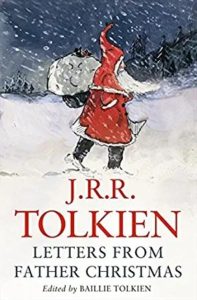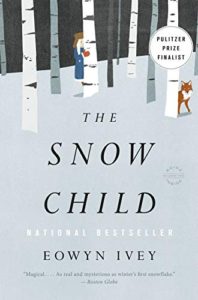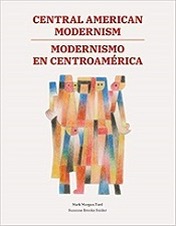10 Christmas Books
(from Esquire)
I am not afraid to say it: I like Christmas movies. I always have. Getting older hasn’t weakened that feeling.
Next week, I’m going to give you a list of great holiday films (many of which are good all year long). Today, I’m passing along a list of 10 great Christmas books recommended by Esquire magazine.

Letters From Father Christmas, by J.R.R. Tolkien
Beginning in 1920, every Christmas in the Tolkien household was marked by a very special delivery: a letter postmarked from the North Pole, written in Father Christmas’ spindly script, containing fantastical tales of everything from escaped reindeer to accident-prone polar bears. (You can guess that Tolkien, the master myth-maker himself, was the man behind the curtain.) This handsome keepsake anthologizes two decades of Tolkien’s letters, along with beautiful reproductions of his whimsical illustrations and handmade North Pole stamps. Share it with the little ones in your life, or enjoy it all on your own.

The Valancourt Book of Victorian Christmas Ghost Stories, edited by Tara Moore
Who says fireside stories should only be feelgood tales? During the holiday seasons of the Victorian era, periodicals often published ghost stories for chilling reading on cold winter nights. Thirteen of those tales are collected here – some by well-known authors, like Sir Arthur Conan Doyle and Elizabeth Gaskell, and others by anonymous or forgotten writers. Even the heaviest pile of blankets won’t stop the shivers from going up your spine.

P.S. Your Cat Is Dead, by James Kirkwood
In this biting cult classic, it’s Christmastime in New York City, and things couldn’t be going worse for Jimmy Zoole: his best friend is dead, his girlfriend is leaving him, he’s out of work, and the only person he can talk to is the burglar tied up in his kitchen. Oh, and his cat is dead, too. If it sounds grim, have no fear – this mordantly funny morality tale is like A Christmas Carol transported to the grimy New York of the seventies.

The Twelve Terrors of Christmas, by John Updike and Edward Gorey
This gimlet-eyed little tome brings together two extraordinary minds: Updike, one of the twentieth century’s greatest writers, and Gorey, the legendary gothic illustrator. Together they take the piss out of “the happiest time of year,” revealing the hidden dark side of familiar holiday tropes, like the tick-ridden reindeer flying the friendly skies. And what’s the big deal about Santa, anyway? “If he’s such a big shot, why is he drawing unemployment for eleven months of the year?” Updike asks. When holiday stress has you at your breaking point, turn to The Twelve Terrors of Christmas for a restorative dose of levity.

The Snow Child, by Eowyn Ivey
With some solid vacation time ahead of you, perhaps you’re just looking to get lost in an absorbing winter’s tale. We suggest The Snow Child, an imaginative debut novel rooted in a beloved Russian fairytale. In 1920s Alaska, where loneliness and despair cast a pall across the harsh frontier, a childless pioneer couple builds a child out of snow. The next morning, their snow child is gone, and in its place, an ethereal little girl has appeared. They come to love this surrogate child as their own daughter, but the mysteries of who she is and what she’s capable of loom large. Magical and mysterious, set in a spellbindingly beautiful and dangerous landscape, The Snow Child will seize your imagination and refuse to let go.

Christmas Days, by Jeanette Winterson
From the visionary writer of Oranges Are Not the Only Fruit and Written On the Body come a dozen imaginative Christmas tales, each one suffused with Winterson’s infectious enthusiasm for the season. From mysteries to romances to ghost stories, there’s a welcome blend of nearly everything here, all of it elevated by Winterson’s distinctive prose. Recipes and recollections link each of the stories, making for a deeply personal keepsake. Feel free to dive in and out at will, rather than read cover to cover – you’ll discover something new every year.

Little Women, by Louisa May Alcott
“Christmas won’t be Christmas without any presents,” opens Little Women, as Jo March grouses about being too poor to celebrate Christmas properly. You may not think of Alcott’s seminal classic about family, girlhood, and duty as a Christmas book, but trust us: bookended by poignant Christmas scenes, it’ll hit you right in the holiday feels. The March family’s provincial New England Christmases, lit by the lambent glow of nostalgia, remind us of the real reasons for the season: generosity, togetherness, and gratitude.

The Night Before Christmas, by Nikolai Gogol
The godfather of Russian literature delivers a folktale unlike anything you’ve likely read before; to this day, it’s still read aloud on Christmas Eve to Russian and Ukrainian children. Gogol unspools the tale of the humble blacksmith Vakula, who goes toe to toe with the devil in a battle for the heart of Oksana, his village’s most beautiful woman. When the devil steals the moon and unleashes a snowstorm on Vakula’s village, Vakula fights back, making for a transporting Old World fairytale about good and evil.

A Treasury of African American Christmas Stories, edited by Bettye Collier-Thomas
Anthologized from Black newspapers and periodicals published between 1880 and 1953, these enchanting Christmas tales are drawn from the Black literary tradition that flowered after the Civil War. Ranging from tragedies to comedies, fables to romances, these stories tackle powerful themes of love, spirituality, racial identity, and so much more. If you’re lured in by writers you know and love, like Langston Hughes and W.E.B. Du Bois, go ahead and get comfortable, because you’re bound to discover so many more.

Holidays on Ice, by David Sedaris
Does it get any better than this seminal volume of side-splitting holiday essays? In the iconic “Santaland Diaries,” David Sedaris remembers his years as Crumpet the Elf, a Macy’s department store elf who finds nothing to celebrate in Santaland. In “Let It Snow,” he bottles the exuberance of childhood snow days, all while weaving a hilarious story about getting locked out of the house during a blizzard. Holidays On Ice is a contemporary classic – and the best medicine for anyone who gets a little misty during this time of year.



